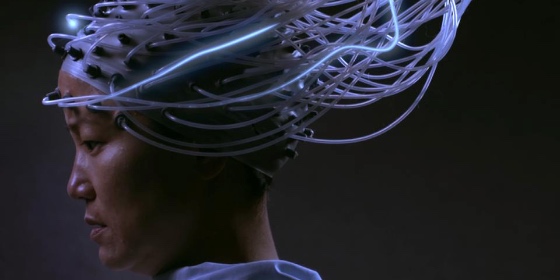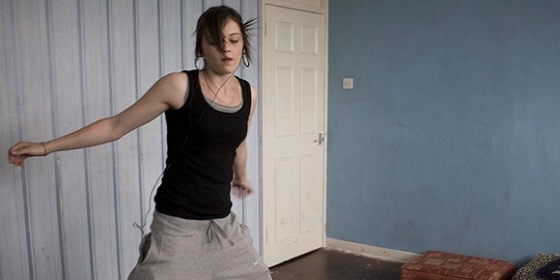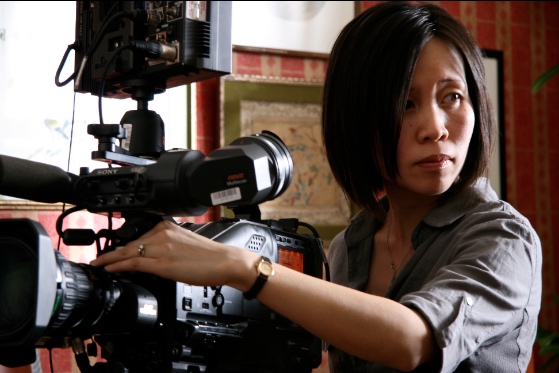
“We do what is best for our children.”
Maternal sacrifice is typically portrayed as an individual act, somewhere in between triumphant (The Blind Side) and tragic (Sophie’s Choice), and nearly always painful. These sacrifices, however, are rarely considered in relation to the vague backdrop of the outside world. (Think of the recent Room, where a mother and her son are literally sealed off from society, left to survive on maternal love alone.) Through these depictions, mothers are re-imagined as neoliberal superbeings, whose singular sacrifices can overcome anything—violence, poverty, war, abuse—while never challenging the very system that creates their conditions for suffering. Jennifer Phang’s Advantageous unveils a world that constructs sacrifice as the only way to survive, showing that even when sacrifice is a conscious decision, it is shaped and pressured by forces beyond the individual.
Set in the year 2041, Phang’s film is the story of a mother who is led to believe that she is this superbeing, only to find that she has never been, and will never be. Gwen (Jacqueline Kim, who co-wrote the film with Phang) is a Korean-American single mom who undergoes an operation that places her soul into a younger body to ensure financial stability for her daughter, Jules (Samantha Kim). Though this process is marketed as a transfer of human consciousness into a new body, unbeknownst to Gwen, the operation is really a cloning process. After cloning the patient’s awareness, the patient dies, and is replaced with an entirely new being to join the workforce.
The future that Gwen and Jules inhabit is a violent one. Outside their apartment, a young girl sleeps under a shrub. Inside, two women, known as the “upstairs” and “downstairs” women, weep loudly. News of terrorism and child sex labour are background noise, and “the pressure to be hyper-productive” has caused widespread infertility. Over the dark streets—and this dark reality—a billboard looms of an elderly woman morphing into a younger woman. “Be the you you were meant to be,” she says, next to a logo of the Center For Advanced Health and Living.
Gwen works for this euphemistically named corporation, which is represented by a headless woman’s torso, embodying its own detached, manufactured idealism. In its promotions, it promises perfection through a “disease free” body. Considering its target audience of older women, disabled women, women of colour, and others who are “defined by” their bodies (by “race, height, or health”), these promotions suggest that the bodies themselves are the “disease” from which one must escape.
In her own body, Gwen feels no such need. Throughout the film, she wears thin, flowing shifts that are form fitting, yet formless enough for fluidity, embodying her unapologetic self-awareness as a middle-aged Asian-American mother. Gwen’s natural acceptance of herself is inherently counter to the world she inhabits (to say nothing of where she works). But her ease of self doesn’t bring ease of mind: on the same day Jules is rejected from a prestigious private school, Gwen is fired from her job as the Center’s spokeswoman. According to her sympathetic, but misguided employer, Fisher (James Urbaniak), the Center is “[going] a different direction”; that marketing is looking for someone “a touch more universal.” As we later find out, the new demand is for racially ambiguous women, implying that Gwen is too specifically herself, too comfortably in her own skin.

Unlike films in which mothers escape their pain through sexual escapades or fits of madness (Possession, Little Children, Antichrist), Gwen seeks solitude. After losing her job, Gwen checks into “the quiet room,” a tiny hotel room without surveillance. She lies on her back and stares at the ceiling, allowing the world to continue on without her. Here, Gwen is not a worker, a mother, or even a woman. With her high heels tossed aside, dress hiked up, legs stretched across the small cell, and arms draped across her chest, she does not need to be anything at all. But this is only a temporary escape; there is a life outside waiting for her.
Without a job, Gwen cannot afford Jules’s tuition, which she already could not afford with her below-rate paycheck. They soon run out of drinking water. Even as her daughter, Jules exacerbates Gwen’s guilt. “I don’t know why I’m alive,” she tells her mother. “Why did you have me, when you knew the world was so bad and you had to struggle so much?” Behind her question is a pointed finger. You did this.
Gwen is not only afraid of failing Jules, but also of failing the standards of motherhood. “There is nothing fiercer than a mother’s love,” she is told by Isa Cryer (Jennifer Ehle), the head of the Center. After telling a group of mothers that she isn’t married, Gwen is met with looks of disgust. “We,” they say, “do what is best for our children.” You do not. When Gwen returns to her apartment, the camera closes in on her face, swamped in murky green light, as she looks to the winding staircase above her, staring into a dark upward spiral.
No one ever explicitly tells Gwen what she must sacrifice. But every glance of pity, every news story on endless destruction, and every reminder of Jules’s insecure future contributes to the illusion that Gwen only has one option—to undergo the Center’s “seamless” operation and reclaim her former job as a younger, more “universal” spokesperson. “Put me into a younger body,” she tells Fisher. “If I can get [Jules] into a good school, she’ll have a chance.” Gwen’s focus on what she can do for Jules through her individual choices shows she still believes in the strength of her own willpower and love. But instead of encouraging this notion, the film exposes its falsehood—it was never her choice to begin with.

Fisher reveals the Center was “expecting that [Gwen] would offer [herself] up.” Everything, from Gwen’s losing her job, to Cryer’s comment about a “mother’s love,” was part of a plan to manipulate Gwen into sacrificing herself for a new body. (Choosing a body of a less “Asian” appearance erases the specificity of a body that Gwen herself embraces, lumping her in with the singular “we” of universalized motherhood.) When Fisher tells her that during the operation she will die, and will be replaced with a person who remembers but does not love Jules, the underlying implication is that the Center cares less about Gwen’s life than her skills as a spokesperson. Torn, Gwen asks her final question: “But this is still Jules’s only chance, isn’t it?” The unspoken answer is “yes.”
But this is only a temporary escape; there is a life outside waiting for her.
What further differentiates Advantageous from other portrayals of motherhood is the refusal to sensationalize suffering. What could have been a bloody, shrieking ordeal is a muted image of glowing wires, neurons of cloned matter leaving Gwen’s mind as she slowly closes her eyes into death. But by exploring the territories of Gwen’s life after death, we see that the consequence of maternal sacrifice, when made under the pressure of outside forces, is not death but division. Gwen’s clone, Gwen 2.0 (Freya Adams) is the Center’s fantasy of the mother as a corporate-owned commodity, as well as the manifestation of Gwen’s sacrifice. Though she possesses Gwen’s memories and characteristics, according to Fisher, she lacks the “awareness” of the original Gwen: her ability to critically think and feel about the world around her. But this is revealed to be presumptive.
Gwen 2.0 secures the future that Gwen wanted: she wins a promotion along with her original job, a spot in the social elite, and a private school education for Jules. And yet she is in both physical and emotional anguish. Because her body cannot contain Gwen’s consciousness, Gwen 2.0 requires multiple shots of medicine a day to prevent “nausea, fatigue, internal bleeding, stroke, paralysis, and death.” The original Gwen’s memories continue to haunt her. Her constant agitation causes her to lash out at Jules, but that she cannot explain why only furthers her frustration. “Because of me,” she sneers at Jules, “you might actually get somewhere.”
To those closest to her, Gwen 2.0 is nothing more than a disappointment. “You are not my mother,” Jules says. When she turns to Fisher for help, he exclaims, “Someone’s gotta straighten out your priorities before you squander everything for Jules,” blaming her for feelings she cannot control. Again, “Gwen” seeks solitude, this time in her bedroom. But her pain of being detached from herself, of being rejected even after giving her life, and of never being enough, follows her there. Despite her lack of “awareness” and the screams of anger raging inside, she’s tried to love Jules all along.
Among critics, Advantageous has been labelled as “soap-operatic,” “tedious,” and “small.” But real motherhood is all of the above. The film does not shy away from the reality of maternal sacrifice as a heavy, tangled mess of politics, families, personal wants and needs. Instead, it implicates us for failing to ease the mother’s burden. As writer Mimi Khúc puts it, we are responsible for “[creating] structures that enable mothering in all its forms, and, most of all, enable mothers to be full people.” This responsibility applies not only to government and family structures but also extends to the structures of storytelling, which limit what determines a “good” mother and the sacrifices she can (and must) make, compartmentalizing that which is beyond single definition for our own pleasure.





